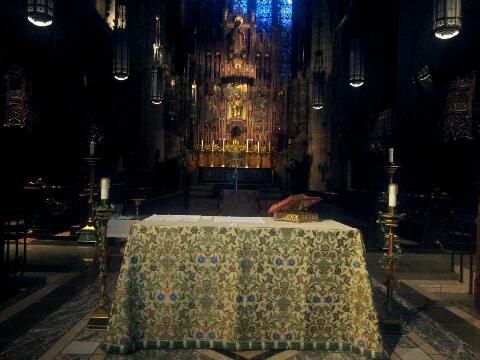This is the fourth and final week I am posting quotations excerpted from St. Thomas Aquinas – Meditations for Every Day, translated and illustrated by Rev. E.C. McEniry, O.P. I hope that you found much fruit for your contemplation. If
you missed any of the previous posts in this series, you can find them here, here. and here.
John is crying in the wilderness for four reasons:
A cry introduces a manifestation, and
therefore, to show that Christ speaks publicly through John and in him.
A cry is sounded to those who are distant. But the Jews were far away from God and hence it was necessary
that John should cry.
He cries because they are deaf to the
voice of God.
He cries because he speaks with
righteous indignation; for these unbelievers
have merited the anger of God.
The Nativity is the work of the Father who sent His Son,
the work of the Son, who assumed human nature, and the work of the Holy Spirit
in causing the conception.
The Son of God became the Son of man so that He might
make men sons of God. The only begotten
Son of God made many sons of God…He redeemed the slave, honored the undeserving,
gave life to the dead. – St. Augustine.
So that man might eat the Bread of Angels, the Creator of
the Angels became man. - St. Augustine.
The manna descended from heaven, so that the hungry may
rejoice-St. Bernard.
God became man, so that He might make all mankind happy
in Him, and that the entire love of man might be centered in Him, and that the
entire conversion of men might be towards Him… St. Augustine
The perfect happiness of man consists in the immediate
vision of God.
In order that man might obtain perfect certitude
concerning the truth of faith and receive Divine instruction in a human way, it
was necessary that he be instructed by God Himself, made Man.
God’s love for man could not be shown in a more powerful
way than that He willed to be united to man in Person. For it is a characteristic of love to unite
the lover with the beloved.
It is clear that happiness is the reward of virtue, and
so it was necessary that those tending to happiness be disposed to virtue…But
even in the holiest of men some defects are found, hence, it was necessary for
man, so that he might be most firmly established in virtue, that he receive the
doctrine and examples of virtue from God, made man.
God showed us His goodness in communicating His Divinity,
but he showed His mercy in assuming our nature.
In truth, there are four great blessings which have come
down to us from the birth of Christ:
We find in Him the greatest purity
because He is the brightness of eternal light,
and the unspotted mirror of God’s majesty, and the image of His goodness;
In this Child, we find the greatest
humility for He took the form of a slave, was
born in a stable, was wrapped in swaddling clothes and was laid in a manger;
We find in the Christ Child the
highest kind of lovableness; and
We find in the Christ Child the
greatest pleasingness.
(Source: St. Thomas Aquinas – Meditations for Every
Day, translated and illustrated by Rev. E.C. McEniry, O.P.)





